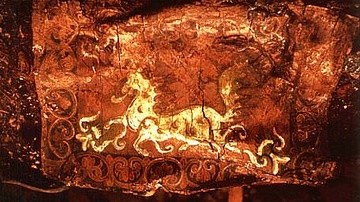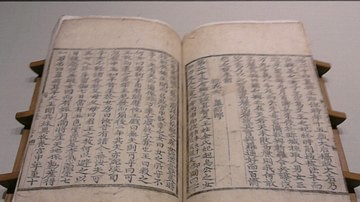Search Definitions
Browse Content (p. 217)

Definition
Kim Yu-sin
Kim Yu-sin (aka Kim Yushin, 595-673 CE) was a general of the Silla kingdom which ruled south-eastern Korea during the Three Kingdoms Period. Kim would greatly help Silla unify Korea, famously leading a massive army to crush the rival kingdom...

Definition
Cheonmachong
Cheonmachong is a 5-6th-century CE royal tomb of the ancient Silla kingdom of Korea located at the Daereungwon Tomb Complex in Gyeongju. It is popularly known as the 'Heavenly Horse Tomb' because of a painting of that animal on a birch-bark...

Definition
Ghosts in Ancient Egypt
A text known as The Lay of the Harper, dating from the Middle Kingdom (2040-1782 BCE) encourages its audience to make the most of the time because death is a certainty: Make a holiday! And do not tire of playing! For no one is allowed to...

Definition
Hyangga
Hyangga was a form poetical 'country song,' distinct from contemporary Chinese songs, which were written in the Silla and Goryeo kingdoms of ancient Korea between the 7th and 10th century CE. The indigenous songs cover such topics as love...

Definition
Choe Chiwon
Choe Chiwon (857-915 CE) was a celebrated poet and scholar of the Unified Silla kingdom which ruled Korea from 668 to 935 CE. Choe Chiwon adopted the pseudonym or brush name 'Orphan Cloud' and he became the most celebrated scholar-official...

Definition
The Great Sphinx of Giza
The Great Sphinx of Giza is the most instantly recognizable statue associated with ancient Egypt and among the most famous in the world. The sculpture, of a recumbent lion with the head of an Egyptian king, was carved out of limestone on...

Definition
Samguk Yusa
The Samguk yusa ('Memorabilia of the Three Kingdoms') is a 13th-century CE text which covers the history and legends of Korea's founding right up to the 10th century CE. It is a sequel of sorts to the earlier Samguk sagi ('Records of the...

Definition
Korean Pottery
The pottery of ancient Korea stretches back to prehistory when simple brown wares were made and decorated with geometrical incisions. Potters would benefit from the ideas and techniques of their Chinese counterparts and go on to produce their...

Definition
Roman Egypt
The rich lands of Egypt became the property of Rome after the death of Cleopatra VII in 30 BCE, which spelled the end of the Ptolemaic dynasty that had ruled Egypt since the death of Alexander the Great in 323 BCE. After the murder of Gaius...

Definition
Bulguksa Temple
The Bulguksa Temple (aka Pulguk-sa Temple or 'Temple of the Buddha Land') was built in the 8th century CE on the wooded slopes of Mt. Tohamsan at the ancient Silla capital of Geumseong (modern Gyeongju, South Korea). The Buddhist temple...